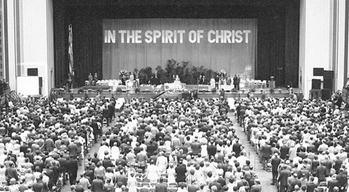I’m regularly surprised, though I shouldn’t be, at the level of dysfunction, mean-spiritedness and sinfulness that can be displayed at a church business meeting. Some of the Pastor’s I speak with relay stories and incidences that sound more like a Jerry Springer show and less like a gathering of the people of God who have come together to make decisions inline with being a church on mission.
Pastoral training typically prepares one to study and preach, provide spiritual care and counsel, perform basic church administration and evangelize. Little to no training is dedicated toward identifying and addressing organizational, relational and psychological dysfunction, conflict de-escalation, conducting civil meetings and addressing or shutting down verbal attacks put on public display for those gathered at the Church’s decision making meeting.
Pastors hear this word. You must guard and protect the flock—you must address sinful and destructive behavior that is displayed publicly in the gatherings of the Church when and where it happens.
You must not be nice—for the sake of the Gospel.
If your bride was under attack, if she was being assaulted, if her reputation was being maligned and her character slandered you would not allow it to happen. You would shut it down, you would remove the offender you would protect her whatever the cost.
Yet, some Pastors fail to protect the Bride of Christ—the Church, from bullies, dysfunctional and sinful members.
How can you protect the Bride when sinful actions arise in a business meeting at Church? You must be reactive and proactive, the more proactive you can become the less likely you will experience bad business meetings.
Consider these actions:
1. Serve as the Moderator—you are called to lead the congregation, it’s your role to lead the church as it discusses business—church business is fundamentally about mission. Don’t abdicate this role nor be bound by tradition or bylaws that say the Pastor can’t serve in this role.
2. Cast Vision/Set Ground Rules—let those gathered know what the purpose of the meeting is, how everyone is to conduct themselves and that behavior and that actions inconsistent with the conduct expected of Christ followers will not be tolerated or allowed. Graciously and firmly share with everyone that the meeting will end if it is not Christ honoring and unifying.
3. Call People Out Publicly—it’s amazing what some people say in a public forum, it’s even more amazing that no one calls people out when they cross the line. Pastor-if you fail to address sinful behavior when it is demonstrated publicly you will undermine your authority and leadership credibility. You can call out someone with grace and tact and love. Do not be afraid.
4. Establish an Agenda and Process—there’s nothing biblical about “old” or “new” business agenda line items. Determine what needs to be discussed and what doesn’t, invite trusted members to assist you with this. If someone wants to add an agenda item make it clear that they can through a process—submitting their request through a defined process beforehand. Accepting new agenda items from the floor isn’t wise, it’s foolish.
5. Vote on Few Things—the more you vote, the more opportunity exists for conflict and disagreement. Voting often divides, because some win and some lose. Close votes are not a sign of good process—actually they are a sign of disunity and division, just look at the political parties in our country. A church does well to vote on a few things like: The call of a Sr. Pastor, Annual Budget, Changes in Governance/Constitution, Sale or Acquisition of Property. If you have ministry teams or committees let them do their work and trust them.
6. Make Mission and Prayer the Focus—as your need for voting decreases, take time to shape the congregation spiritually through vision casting for mission. Prayer will bring unity and praying for the Holy Spirit to empower your church propels mission.
7. Change Governance—the preponderance of evidence in the biblical text points to a plurality of Elders who lead the church together with grace and in love. Congregational governance where every member, regardless of spiritual depth and maturity, has an equal vote is founded more in the democratic political structures present in our culture rather than the Bible.
Pastor, lead, guide and protect your church as it makes decisions.
Recommended Resources:
Well Intentioned Dragons by Marshall Shelley
Antagonists in the Church by Kenneth Haugk
Who Runs the Church by Engle and Cowin
Published October 1, 2015


